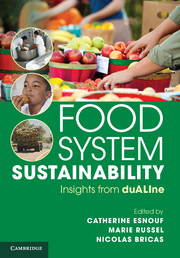Book contents
- Frontmatter
- Contents
- Foreword
- Acknowledgements
- Introduction
- 1 Context: new challenges for food systems
- 2 Consumption and consumers
- 3 Carbon footprint and nutritional quality of diets in France
- 4 Food systems
- 5 Industrial organisation and sustainability
- 6 Urbanisation and the sustainability of food systems
- 7 Losses and wastage
- 8 International trade, price volatility and standards for sustainability
- 9 Elements for a foresight debate on food sustainability
- 10 A critical panorama of methods used to assess food sustainability
- Conclusion
- References
- List of abbreviations
- List of duALIne experts
- Index
7 - Losses and wastage
Published online by Cambridge University Press: 05 April 2013
- Frontmatter
- Contents
- Foreword
- Acknowledgements
- Introduction
- 1 Context: new challenges for food systems
- 2 Consumption and consumers
- 3 Carbon footprint and nutritional quality of diets in France
- 4 Food systems
- 5 Industrial organisation and sustainability
- 6 Urbanisation and the sustainability of food systems
- 7 Losses and wastage
- 8 International trade, price volatility and standards for sustainability
- 9 Elements for a foresight debate on food sustainability
- 10 A critical panorama of methods used to assess food sustainability
- Conclusion
- References
- List of abbreviations
- List of duALIne experts
- Index
Summary
It is necessary to recognise and understand losses and wastage in order to enable their reduction and recovery.
Introduction
The importance of food losses and wastage in the context of sustainability and the lack of understanding of their extent, the mechanisms at play and the role of different stakeholders are such that we have devoted an entire chapter to this subject of crucial importance to the sustainability of food systems.
In this chapter we will define the losses and wastage that affect products intended directly for human consumption, in both Northern and Southern countries, without specifying the food systems in which they occur. By analysing recovery options of these lost or wasted products, this chapter will fuel the debate referred to in Chapter 4 on the interlocking character of food, energy and chemical systems and on the circular economy of agricultural biomass.
Losses and wastage are not linked to stakeholders’ carelessness. In Northern countries, they are the visible result of socioeconomic changes to food systems at a planetary level (globalisation of markets, industrialisation of processing, etc.), and of changes in value systems (leisure time versus food preparation time) (Soyeux, 2010).
The growth of the world’s population, the perception of the finite supply of arable land, the affirmation of the right to food and rises in the cost of agricultural products are all drivers that place human food consumption at the forefront of political and social concerns.
- Type
- Chapter
- Information
- Food System SustainabilityInsights From duALIne, pp. 136 - 157Publisher: Cambridge University PressPrint publication year: 2013
- 2
- Cited by



